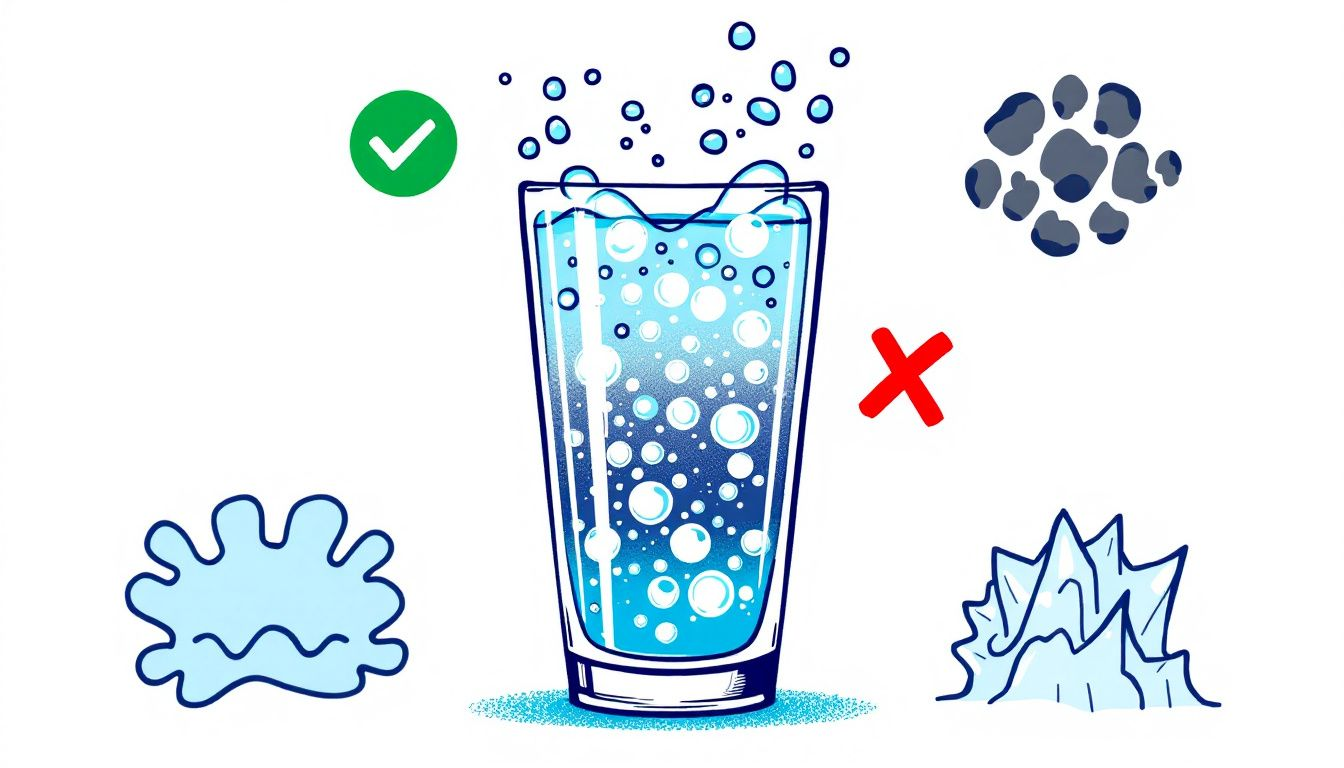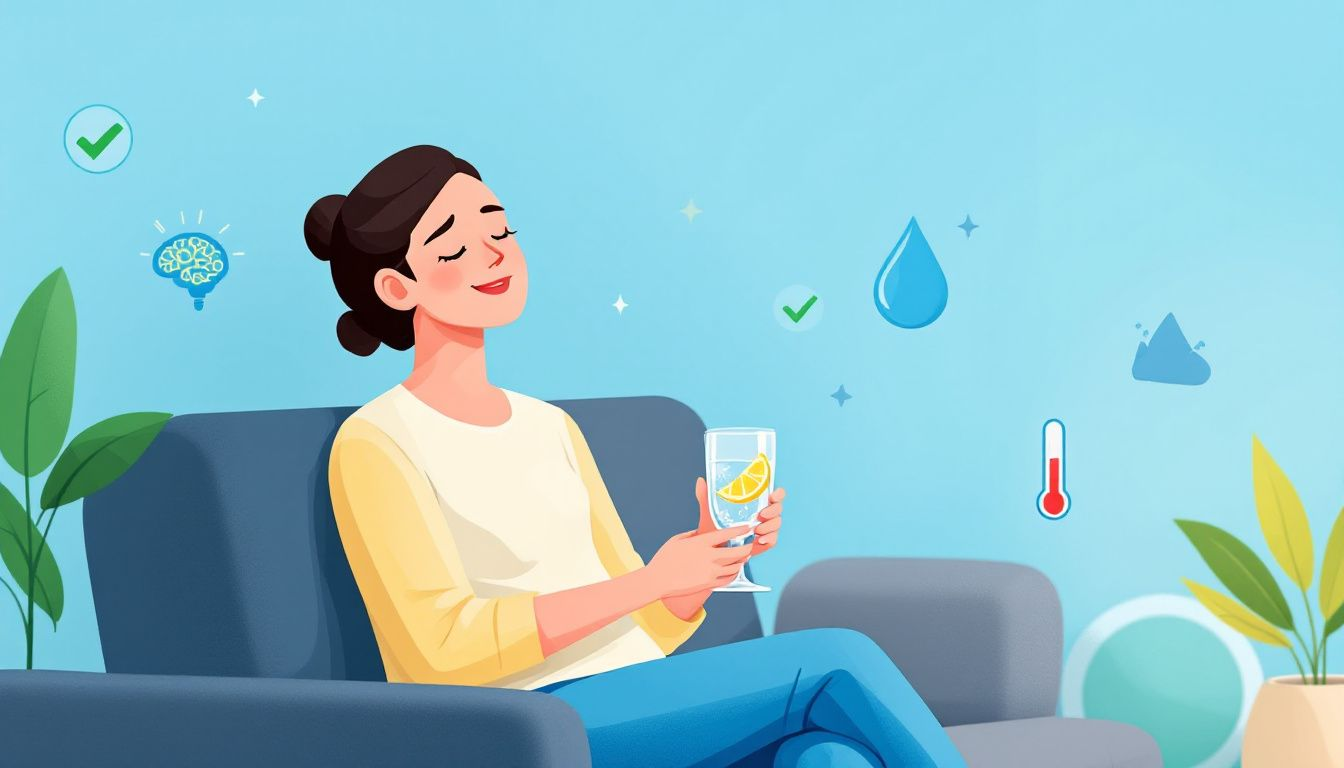Is sparkling water bad for health? Whether you’re sipping it for hydration or as a soda alternative, it’s important to know if it poses any health risks. This article examines the potential effects on your teeth, digestion, and overall well-being.
Understanding Sparkling Water

Sparkling water is simply water that has been infused with carbon dioxide gas under pressure, creating those delightful bubbles that dance on your tongue. This process of carbonation can occur naturally, as in the case of sparkling mineral water sourced from mineral springs, or it can be achieved artificially by adding carbon dioxide to plain water. The result is a refreshing beverage that offers a fizzy sensation without the calories and sugars found in traditional sugary sodas and soft drinks.
There are several types of sparkling waters, each with unique characteristics and flavors. Seltzer water is plain sparkling water without any added minerals, making it a neutral choice for those who prefer simplicity. Club soda, on the other hand, contains added minerals like potassium sulfate and sodium chloride, which enhance its taste.
Sparkling mineral water is naturally carbonated and contains various minerals depending on its source, offering potential health benefits. Lastly, tonic water is a unique type of sparkling water that includes quinine for a distinct bitter flavor and often has added sugars, making it less healthy than other options.
Potential Health Concerns of Drinking Carbonated Water

While sparkling water is generally considered a healthier alternative to sugary drinks, there are some potential health concerns to be aware of. One common misconception is that sparkling water is harmful to health due to its acidity. However, the possible risks associated with drinking sparkling water include dental erosion, digestive discomfort, and hidden ingredients.
These concerns can be explored in more detail.
Dental Erosion Risk
One potential risk of drinking sparkling water is dental erosion. The increased acidity from added flavorings like lemon can potentially lead to enamel erosion, although the carbonic acid in sparkling water is not as strong as citric acid or sugar, making it less harmful to enamel. Research indicates that carbonated drinks, including sparkling water, are significantly less harmful to tooth enamel compared to sugary soft drinks. Carbonated water does not increase the risk of dental erosion more than still water.
Avoid replacing fluoride-rich water with sparkling water and limit its intake to meals rather than sipping throughout the day to protect dental health.
Waiting 20-30 minutes after consuming sparkling water before brushing your teeth can also help protect enamel from acid damage. Moderation in drinking sparkling water can help limit tooth exposure to acidity and maintain oral health.
Digestive Discomfort
Another potential concern with sparkling water is digestive discomfort. The carbonation in sparkling water can lead to gas, bloating, and acid reflux issues in some individuals. The carbonation process creates carbonic acid, which may exacerbate symptoms like acid reflux. Sparkling water does not directly cause irritable bowel syndrome (IBS), but it may worsen bloating for some individuals with this condition.
Experiencing excessive gas or bloating after drinking sparkling water may indicate that it’s best to limit your consumption or avoid it altogether. Since everyone’s digestive system is different, pay attention to how your body reacts to carbonated beverages and adjust your intake accordingly.
Hidden Ingredients
Hidden ingredients in some sparkling waters can pose health risks. Some brands add sugars and artificial sweeteners to enhance flavor, which can have adverse effects on your health. Artificial sweeteners in sparkling water can negatively impact the gut microbiome and nutrient absorption. Individuals monitoring their blood glucose levels should avoid sparkling waters with added sugar.
The best sparkling water choices are those that are unsweetened and free of unnecessary additives. Choosing plain or unsweetened sparkling water ensures hydration benefits without the risks associated with sweeteners and sugars.
Benefits of Drinking Sparkling Water

Despite the potential health concerns, drinking sparkling water offers several benefits. Sparkling water is a better choice than sugary soda, juice, and energy drinks, as it provides hydration without added sugars or calories. It can help curb cravings for sugary drinks by providing a fizzy sensation, making it easier to transition away from unhealthy beverages.
Sparkling water also increases fluid intake and can aid in weight management by creating a sensation of fullness.
Hydration Support
Sparkling water serves as a valuable addition to hydration efforts. It is equally hydrating as plain water, making it a great choice for those who find plain water boring or unappealing. The fizzy nature of sparkling water provides an enjoyable drinking experience, encouraging those who dislike plain water to consume more and stay hydrated.
Incorporating sparkling water into your daily routine can enhance hydration and provide a refreshing alternative to sugary drinks, helping to avoid dehydration and increase your sparkling water intake.
Weight Management Aid
Unsweetened sparkling water can help control calorie intake by satisfying thirst without added sugars. It provides a low-calorie alternative to sugary drinks, making it an effective aid for weight management efforts.
Sparkling water may help reduce cravings for sugary beverages and support weight loss goals by promoting a feeling of fullness.
Relieving Constipation
Sparkling water may have potential benefits in relieving constipation, a common digestive issue. Research suggests that sparkling water may aid in alleviating symptoms associated with constipation by promoting digestive health.
Carbonation in sparkling water can improve digestion and relieve constipation for some individuals.
Comparing Sparkling Water Varieties
When it comes to sparkling water, there are several varieties to choose from, each with unique characteristics. Seltzer, club soda, sparkling mineral water, and tonic water all fall under the category of carbonated beverages, but they differ in their mineral content and flavors.
These differences can help you make an informed choice about which type of sparkling water best suits your preferences and health needs.
Seltzer Water vs. Club Soda
Seltzer water is simply carbonated water without any added minerals, making it a neutral choice for those who prefer simplicity.
Club soda, on the other hand, contains added minerals like sodium bicarbonate and potassium sulfate, which enhance its taste and give it a slightly salty flavor. Checking labels for sodium content is essential, as club soda often has added sodium bicarbonate.
Sparkling Mineral Water
Sparkling mineral water is sourced from mineral springs and contains naturally occurring minerals that can provide health benefits. These minerals vary depending on the spring source and can include essential nutrients beneficial to health, including mineral waters.
Naturally carbonated sparkling mineral water offers a unique taste and potential health advantages over artificially carbonated waters.
Tonic Water Considerations
Tonic water is unique among carbonated drinks due to its sweetening agents and quinine, leading to higher calorie content. It typically contains high levels of sugar, making it less healthy than other carbonated water options.
The added sugars and quinine can contribute to calorie intake and potential health issues when consumed in excess.
Addressing Common Myths About Sparkling Water

There are many misunderstandings regarding the health impacts of drinking sparkling water, especially concerning its effects on bone density and heart health.
Let’s address some of these common myths to provide a clearer picture of the reality.
Bone Health Concerns
Studies indicate that sparkling water does not negatively affect bone health, as it lacks the phosphorous associated with lower bone density. Research shows that carbonated beverage consumption does not significantly impact bone mineral density in older women.
There is no scientific evidence supporting the idea that carbonated water negatively impacts bone health. Many consumers worry that drinking carbonated water might harm their bone health, but these concerns are unfounded.
Heart Health Impact
Heart health is a common concern regarding dietary choices, including drinking carbonated beverages and carbonated water consumption. Current studies provide limited evidence on the relationship between carbonated water consumption and cardiovascular health. However, the available research suggests that carbonated water has no significant adverse effects on heart health.
More research is needed to fully understand the impact of sparkling water on cardiovascular health due to the inconclusive and limited evidence.
Acid-Base Balance
A common myth is that the acidity of sparkling water disrupts the body’s acid-base balance. However, the acidity of sparkling water does not influence the body’s overall acid-base balance due to its low pH level. The body’s buffering systems neutralize the acidity of sparkling water, ensuring that it has no effect on overall acid-base equilibrium.
The body tightly regulates its pH levels, so sparkling water’s weak acid does not pose a risk to acid-base balance.
Practical Tips for Enjoying Sparkling Water
Incorporating sparkling water into your diet can be a healthy alternative to sugary drinks when consumed wisely. Flavored sparkling water can enhance taste without adding calories if natural flavors are used.
However, following some practical tips, such as choosing unsweetened varieties, protecting dental health, and consuming in moderation, ensures you enjoy sparkling water healthily.
Choosing the Right Type
Opting for unsweetened sparkling water avoids added sugars and artificial sweeteners that can have negative health effects. Unsweetened sparkling water offers a healthier alternative to sugary sodas, providing hydration without the extra calories.
Varieties of sparkling water include seltzer, club soda, and sparkling mineral water, each with distinct characteristics and nutritional profiles. To protect dental health, consider rinsing with plain water after consuming sparkling water, and moderate your intake to prevent digestive discomfort.
Protecting Dental Health
Rinsing with plain water after consuming sparkling water can aid in reducing acidity and protecting teeth. To minimize the impact on teeth, rinse your mouth with plain water after consuming sparkling water.
Specially formulated toothpaste can help strengthen tooth enamel and reduce sensitivity when consuming carbonated drinks. Using a straw can reduce the direct contact between the acidic beverage and teeth, lessening the risk of enamel erosion.
Moderation is Key
Excessive intake of sparkling water may lead to digestive discomfort, hence moderation is recommended. Moderate consumption of sparkling water alongside other hydrating drinks like plain water and milk can support a healthy balance and mitigate potential digestive discomfort from carbonation.
Mixing sparkling water with still water can also help mitigate potential digestive issues.
Quench Your Thirst the Healthier Way
Sparkling water is more than just a fizzy treat—it’s a refreshing, healthier alternative to sugary drinks and sodas. From hydration support to weight management and even digestive health benefits, it’s the perfect addition to your daily routine.
Ready to make the switch? At Drinkmate Singapore, we make it easy for you to enjoy sparkling water your way. Explore our collection of soda makers, zero-calorie syrups, and accessories designed to elevate your beverage game—all while protecting your health and the planet.
Click here to shop now: Visit Drinkmate Collections
Experience the sparkle. Transform your hydration. Only with Drinkmate.
Frequently Asked Questions
Is sparkling water good for losing weight?
Sparkling water can be an effective tool for weight loss as it helps curb appetite and promotes a feeling of fullness, assisting in calorie reduction. Consider incorporating it into your diet for better weight management.
Does sparkling water cause tooth decay?
Sparkling water is less damaging to tooth enamel than sugary soft drinks but can still pose a risk if consumed excessively. To safeguard your teeth, enjoy it in moderation and rinse with plain water afterward.
Can sparkling water cause digestive issues?
Yes, sparkling water can cause digestive issues such as gas, bloating, and acid reflux in some individuals. It's crucial to pay attention to your body's responses and adjust your consumption as needed.
Is sparkling water as hydrating as regular water?
Sparkling water is just as hydrating as regular water, making it a suitable alternative for those looking to diversify their hydration options.
Does sparkling water negatively affect bone health?
Sparkling water does not negatively affect bone health and does not significantly impact bone mineral density. You can enjoy it without concern for your bones.
